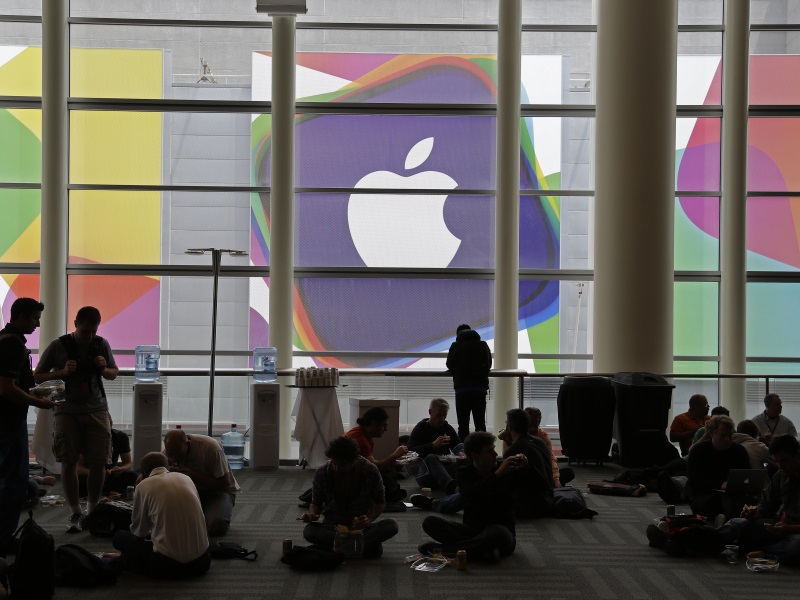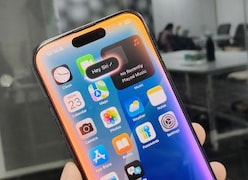- Home
- Mobiles
- Mobiles Features
- US Government, Apple Take Encryption Case to Court of Public Opinion
US Government, Apple Take Encryption Case to Court of Public Opinion

Apple Chief Executive Tim Cook also sent a letter to employees Monday morning, making clear the company's hardline stance refusing to make software to unlock the phone addresses broader issues, not just a single device linked to a grisly attack.
"This case is about much more than a single phone or a single investigation," Cook said in the email to employees, seen by Reuters. "At stake is the data security of hundreds of millions of law-abiding people, and setting a dangerous precedent that threatens everyone's civil liberties."
But FBI Director James Comey, in an article published late Sunday on the national security legal blog Lawfare, asserted the case was not about setting a new legal precedent but rather about "victims and justice."
(Also see: Why Even the FBI Can't Hack the iPhone)
"Fourteen people were slaughtered and many more had their lives and bodies ruined," Comey wrote. "We owe them a thorough and professional investigation under law. That's what this is."
A federal judge last week ordered Apple to create new software and take others steps to retrieve data from the locked phone, used by Syed Rizwan Farook, one of the San Bernardino shooters, who was killed in a gun battle with police.
The company is fighting the order, arguing that creating such a key will jeopardise the security of all iPhones. The company's formal legal arguments are expected Friday.
The Justice Department's manoeuvres over the past week have prompted Apple supporters to suggest the case is as much about putting political pressure on Apple and influencing the broader policy debate on encryption as it is about getting data from Farook's phone.
The Justice Department launched its unusually public campaign to force Apple's hand by publicizing the court order itself, which normally would have been under seal, according to legal experts. Then, on Friday, the Justice Department filed additional court papers that repeated its legal arguments and criticized the company's resistance as a "brand marketing strategy." The government acknowledged that the Friday filing was "not legally necessary."
Apple responded hours later by holding a conference call with reporters - a rare move by a generally reticent company that is accustomed to making news rather than reacting to it. That was followed early Monday by a public blog post and an internal email to employees arguing the company's case.
Meanwhile, the government has actively solicited victims of the shooting to join its case against Apple.
Farook and his wife, Tashfeen Malik, destroyed their personal phones before carrying out the December 2 shooting rampage in San Bernardino, California, which killed 14 and wounded 22. Authorities believe the couple was inspired by the Islamic State. The phone at issue is an iPhone 5c issued to Farook by San Bernardino County in his role as a health inspector.
(Also see: Apple Being Asked for Access to Just One iPhone)
Digital security commission
The case has revived interest on Capitol Hill in pursuing legislation to address the problem of what law enforcement officials call "going dark" - where tight digital security prevents them from accessing the data of criminal suspects.
The idea of setting up a commission - which may be a prelude to a broader legislative solution - is not new, although a political resolution of the data privacy and encryption debate has proven elusive for many years.
A digital security commission comprising technology, business and law enforcement experts has been proposed by Democratic Senator Mark Warner and Republican Representative Michael McCaul, who chairs the Homeland Security Committee, to help break the impasse over encryption.
The bipartisan pair is scheduled to unveil details of legislation that would create a panel at a Washington event on Wednesday.
Apple indicated it would work with a commission or panel of experts to discuss the matter further.
"Apple would gladly participate in such an effort," the company wrote in the Monday post on its website addressing questions about the case.
The company could not be immediately reached for further comment.
The Justice Department has pushed back on framing the dispute as an encryption issue, insisting that it is only trying to get past the lock screen on one phone. Apple has argued that while it is technically possible to bypass the security features of the iPhone by building a new operating system, such a move would set a dangerous precedent.
Bipartisan leaders of the US House Energy and Commerce Committee late Friday invited Apple's Cook and FBI Director James Comey to testify at an upcoming hearing on encryption, though no date was set.
Senators Richard Burr and Dianne Feinstein, the top Republican and Democrat of the Senate Intelligence Committee respectively, have long said they intend to introduce legislation that would force a company to be able to grant authorities access to a suspect's data, though a bill has not yet materialized.
Some victims of the attack will file a legal brief in support of the US government's attempt to force open to unlock the phone, a lawyer representing the victims told Reuters on Sunday.
© Thomson Reuters 2016
Get your daily dose of tech news, reviews, and insights, in under 80 characters on Gadgets 360 Turbo. Connect with fellow tech lovers on our Forum. Follow us on X, Facebook, WhatsApp, Threads and Google News for instant updates. Catch all the action on our YouTube channel.
Related Stories
- Samsung Galaxy Unpacked 2025
- ChatGPT
- Redmi Note 14 Pro+
- iPhone 16
- Apple Vision Pro
- Oneplus 12
- OnePlus Nord CE 3 Lite 5G
- iPhone 13
- Xiaomi 14 Pro
- Oppo Find N3
- Tecno Spark Go (2023)
- Realme V30
- Best Phones Under 25000
- Samsung Galaxy S24 Series
- Cryptocurrency
- iQoo 12
- Samsung Galaxy S24 Ultra
- Giottus
- Samsung Galaxy Z Flip 5
- Apple 'Scary Fast'
- Housefull 5
- GoPro Hero 12 Black Review
- Invincible Season 2
- JioGlass
- HD Ready TV
- Laptop Under 50000
- Smartwatch Under 10000
- Latest Mobile Phones
- Compare Phones
- OPPO A6v 5G
- OPPO A6i+ 5G
- Realme 16 5G
- Redmi Turbo 5
- Redmi Turbo 5 Max
- Moto G77
- Moto G67
- Realme P4 Power 5G
- HP HyperX Omen 15
- Acer Chromebook 311 (2026)
- Lenovo Idea Tab Plus
- Realme Pad 3
- HMD Watch P1
- HMD Watch X1
- Haier H5E Series
- Acerpure Nitro Z Series 100-inch QLED TV
- Asus ROG Ally
- Nintendo Switch Lite
- Haier 1.6 Ton 5 Star Inverter Split AC (HSU19G-MZAID5BN-INV)
- Haier 1.6 Ton 5 Star Inverter Split AC (HSU19G-MZAIM5BN-INV)

















